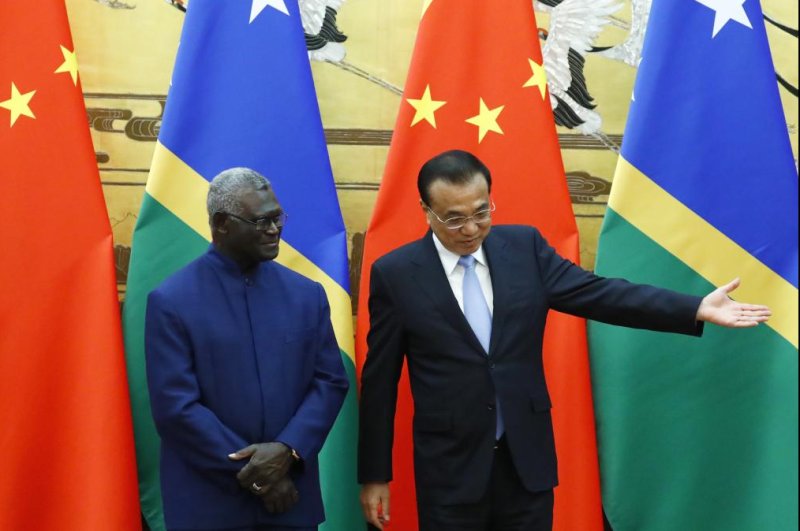The Solomon Islands and China have come to an agreement on a security deal, Prime Minister Manasseh Sogavare (L) announced Thursday, raising alarms from Australia and allies in the region. Sogavare switched the country's diplomatic recognition from Taiwan to China in 2019. File Photo by Thomas Peter/EPA-EFE/Pool
March 31 (UPI) -- The tiny Solomon Islands officially agreed on Thursday to a security deal with China that's sparked concern from Australia and regional allies that Beijing will gain its first military foothold in the South Pacific.
The two countries initialed a bilateral security cooperation framework, the Honiara-based prime minister's office of the Solomon Islands announced in a statement. The document now awaits signatures by the countries' foreign ministers.
A draft version of the agreement, which leaked online last week, said that Beijing would be able to send naval deployments and security forces to the island nation, which is located 1,200 miles from Australia.
"China may, according to its own needs and with the consent of the Solomon Islands, make ship visits to, carry out logistical replenishment in, and have stopover and transition in Solomon Islands," the draft said.
The Solomon Islands could also "request China to send police, armed police, military personnel and other law enforcement and armed forces," according to the agreement.
News of the deal triggered an immediate backlash in the region, with the governments of Australia and New Zealand expressing alarm over the Chinese military setting up in their backyard.
Earlier this week, Australian Prime Minister Scott Morrison called reports of the agreement "a reminder of the constant pressure and threats that present in our region to our own national security." New Zealand said the developing relationship is "gravely concerning" and disavowed "the potential militarization of the region," Prime Minister Jacinda Ardern told Radio NZ.
Solomon Islands Prime Minister Manasseh Sogavare defended the deal in a speech to parliament Tuesday, saying it was "very insulting to be branded as unfit to manage our sovereign affairs."
"There is no intention to ask China to build a military base in Solomon Islands," he said, according to the Australian Broadcasting Corporation. "We are not pressured in any way by our new friends."
Federated States of Micronesia President David Panuelo sent a letter to Sogavare on Wednesday urging him not to sign the pact and warned that their smaller countries would get caught in the middle of a growing power struggle between the United States and China.
"My fear is that we -- the Pacific Islands -- would be at the epicenter of a future confrontation between these major powers," he wrote.
Ahead of the deal's announcement Thursday, the Australian military's chief of joint operations, Lt. Gen. John Bilton, told reporters that China's presence nearby would have a significant impact on defense operations.
"It does change the calculus if Chinese navy vessels are operating from the Solomon Islands," Bilton said, according to the Australian Broadcasting Corporation.
"They are in much closer proximity to the Australian mainland and that would change the way we would undertake day-to-day operations, particularly in the air and at sea."
The Solomon Islands has been at the center of a growing geopolitical rivalry in the region ever since Sogavare suddenly switched diplomatic recognition from Taiwan to China in 2019. That move, which was accompanied by allegations of kickbacks and bribery, inflamed local disputes and ultimately led to days of deadly rioting last November amid demands for Sogavare's resignation.
The United States has turned an increasing focus on the region in response to China's influence. In February, the U.S. State Department announced it would reopen its embassy in the Solomon Islands after almost 30 years.
The United States, Britain and Australia also announced the AUKUS security partnership in September, which includes technology-sharing that will allow Australia to build nuclear submarines for the first time.
Australia and New Zealand, along with Papua New Guinea and Fiji, sent peacekeeping troops to the nation of 700,000 to help quell the unrest five months ago and have said they will continue to maintain a presence there, even amid the imminent deal with China.
Sogavare's office thanked the countries for sending the peacekeepers in the statement Thursday and said the Solomon Islands "seeks greater security partnership with other partners and neighbors."
Honiara will uphold its foreign policy of "friends to all and enemies to none," his office said.















